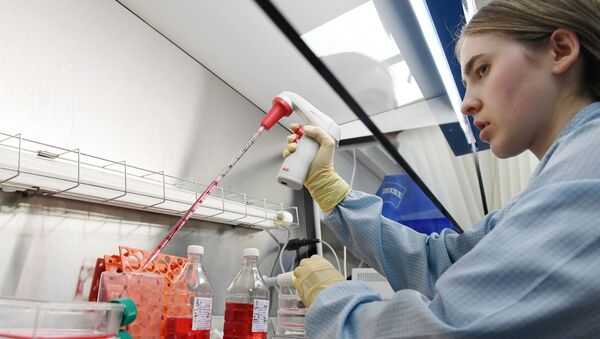Russian scientists are waging a war against the coronavirus on three major fronts: diagnostics, prevention, and treatment. Diagnostics implies introducing new sophisticated test systems for detecting SARS-CoV-2 and analysing antibodies. A vast number of anti-COVID vaccines currently being tested by the researchers is aimed at preventing the virus, while treatment includes the development of recombinant drugs of specific bodies which neutralise the virus, as well as antiviral medication with pronounced anti-SARS-CoV-2 activity.
The projects were presented and described in detail during a recent meeting of the Presidium of the Russian Academy of Sciences, held with support from the Ministry of Science and Higher Education of the Russian Federation and the Scientific Russia portal.
Advanced Diagnostics
The Engelhardt Institute of Molecular Biology and National Research Centre for Haematology has created a test system based on an enzyme immunoassay for detecting SARS-CoV-2. The receptor-binding domain (RBD) of the spike protein, which is specific to SARS-CoV and SARS-CoV-2, served as an immunogen. The recombinant protein has been developed in mammalian cells.
“Detected antibodies are neutralising antibodies, which is very important", says Vladimir Chekhonin, the vice president of the Russian Academy of Sciences. At the same time, the test system allows for the detection of immunoglobulin G with a sensitivity of 95% and specificity of 98%, he highlights, adding that the system has already been used in laboratories.
Promising Vaccines
Meanwhile, eight candidate vaccines have been registered for clinical trials in Russia, namely, two vector vaccines, two RNA vaccines, four inactivated (or killed) vaccines, one subunit vaccine, and one DNA vaccine. Besides this, 26 vector, 43 subunit, 10 DNA, five inactivated vaccines, and some other preventive medicines have entered the preclinical research stage.
According to Chekhonin, Russian scientists are creating an unusual anti-COVID vaccine, which can be introduced into the body in the form of yogurt – a mucosal anti-SARS-CoV-2 vaccine being developed by the Institute of Experimental Medicine. Chekhonin explains that the vaccine's developers have used genetic engineering methods to embed an S-protein in the villi on the surface of probiotic microbes; S-protein is a key molecule for SARS-CoV-2 to penetrate cells. A bacterium is formed with the virus’s immunogenic protein on the surface.
"This vaccine can be administered in the form of a fermented milk product", the academician elaborates, adding that preclinical trials of this vaccine are currently underway.
Unique Drugs
In addition to new testing systems and advanced vaccines, RAS scientists have created a drug that could prevent COVID from entering the body. The preclinical trials of the new medicine are now being carried out by military doctors in St. Petersburg, Chekhonin reveals, clarifying that the drug blocks the coronavirus' interaction with epithelial cells. According to him, this work is being conducted under the guidance of Academician Vladimir Popov at the Federal Research Centre “Fundamentals of Biotechnology” of the Russian Academy of Sciences.
“It’s important to point out that coronaviruses use heparan sulfate glycoconjugates for primary interaction with the host cell", the scientist points out. "In this context, 5-nitropyrimidine derivatives can be used to screen the virus’s interaction with the corresponding specific receptors".
Innovative Predicting
Accurate and proactive planning are no less important than prevention and treatment of the disease. To that end a descriptive and predictive model of the COVID-19 pandemic has been designed by Russian scientists who instrumentalised data mining methods. Machine learning models based on data from St. Petersburg's corona monitoring centre have been developed under the supervision of Evgeny Shlyakhto, an academician from the Russian Academy of Science. Researchers have managed to calculate the likelihood of incidence peaks, the number of discharged patients, and admissions.
In addition, the group outlined detailed multifactor scenarios considering the intensity of deterrent measures, the mortality model, and patient treatment duration.
"This is a very important work, which allows us not only to predict, but also to make active decisions on managing patients and commissioning new capacities for their therapy", Chekhonin concludes.




